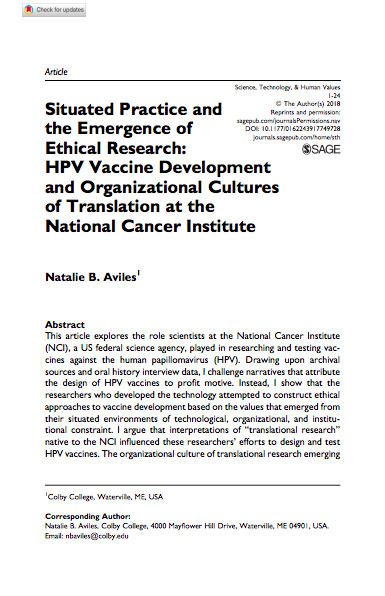
Abstract: "This article explores the role scientists at the National Cancer Institute (NCI), a US federal science agency, played in researching and testing vaccines against the human papillomavirus (HPV). Drawing upon archival sources and oral history interview data, I challenge narratives that attribute the design of HPV vaccines to profit motive. Instead, I show that the researchers who developed the technology attempted to construct ethical approaches to vaccine development based on the values that emerged from their situated environments of technological, organizational, and institutional constraint. I argue that interpretations of “translational research” native to the NCI influenced these researchers’ efforts to design and test HPV vaccines. The organizational culture of translational research emerging in the NCI positioned intramural research as a countervailing and supplementary force to market-oriented translational research and development. Over time, NCI researchers’ conceptions of the Institute’s role allowed them to develop understandings of ethical HPV vaccine research as oriented toward addressing cervical cancer health disparities, especially in developing nations. NCI scientists’ understanding of their role in serving the public good through continued HPV vaccine innovation reflects the material and political economic environment they faced at different historical junctures that constrained the possibilities for innovation and ethical action."
Natalie Aviles, "Aviles, Natalie B. 2018. “Situated Practice and the Emergence of Ethical Research: HPV Vaccine Development and Organizational Cultures of Translation at the National Cancer Institute.” Science, Technology, & Human Values, January. ", contributed by Angela Okune, Platform for Experimental Collaborative Ethnography, Platform for Experimental Collaborative Ethnography, last modified 31 May 2018, accessed 28 April 2025. https://worldpece.org/content/aviles-natalie-b-2018-“situated-practice-and-emergence-ethical-research-hpv-vaccine
Critical Commentary
In this 2018 article, Natalie Aviles argues that contrary to assumptions that the design of the HPV vaccine was for motivations of profit, the researchers who developed the technology were motivated by ethical approaches to vaccine development. She holds that it was the organizational culture that allowed the NCI researchers to develop understandings of their research as ethical (and oriented towards addressing cervical cancer health disparities, especially in developing nations). This paper is relevant for my own research because the moral and ethical call to do research for "public good" is also characteristic of much of the qualitative research work that is done in/on Kenya/Africa.